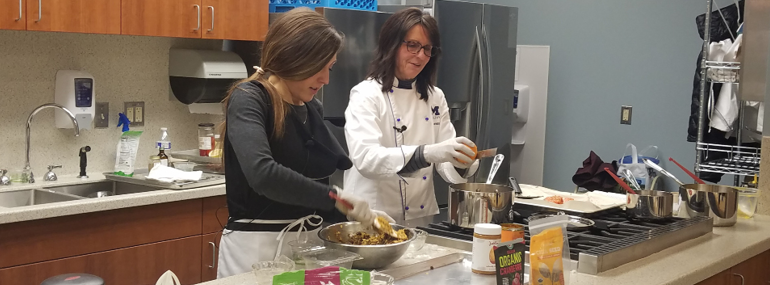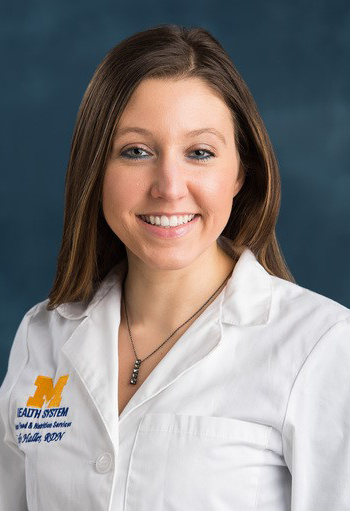
The U-M Food for Life Kitchen began with the idea to recognize the significant role that food and nutrition play in disease prevention, treatment, and wellness.
Certain types of cardiovascular diseases and cancers can be prevented, as well as osteoporosis, obesity, and diabetes, with help from specific foods and nutrition. It should come as no surprise that nutrition and diet also play an important role in gastroenterology and liver diseases. Just recently, a study led by Shanti Eswaran, MD, Associate Professor of Internal Medicine, along with several U-M collaborators including William Chey, MD, proved that patients diagnosed with IBS who followed a low FODMAP diet were twice as likely to have an improved quality of life as those who received standard dietary recommendations.
Additionally, with some studies reporting that gastrointestinal and liver diseases result in over $100 billion in health care expenses spent annually, the maintenance of proper nutrition and diet could lower the financial burden it has placed on individuals and insurance companies.
"Maintaining wellness is the most cost-effective means of utilizing health care dollars,” stated William Chey, MD, Nostrant Professor of Gastroenterology & Nutrition Sciences, Director of the GI Physiology Laboratory, Director of the Digestive Disorders Nutrition & Lifestyle Program, and Co-Director of the Michigan Bowel Control Program.
That’s where culinary medicine and the Food for Life Kitchen comes in.
Culinary medicine and the Food for Life Kitchen
Culinary medicine explores the links between food and health, applying the foundations of nutritional science side-by-side with traditional medical interventions in clinical care.

The growing movement and popularity of culinary medicine is important. According to Dr. Chey, nutrition and diet are underserved in the delivery of health care. Health care providers advise their patients to change their eating habits, however, they don’t always have the information or resources to assist their patients with putting their instructions into action. “The Food for Life Kitchen is a huge step in providing patients with the information and resources to operationalize their provider’s dietary recommendations,“ says Chey.
Prior to the Food for Life Kitchen, there wasn’t an umbrella program that brought the divisions and units in the Department of Internal Medicine under one roof. “Everyone’s been doing projects in silos,” he says. “The Kitchen brings everyone together to create an overarching strategy for what constitutes holistic, high-quality care by providing a place to determine the appropriate tools and mechanisms to achieve its goals and allowing for the sharing of resources, ideas, and best practices.”
More about the Kitchen
The Food for Life Kitchen, designed to handle cooking demonstrations, lectures, and hands-on learning, is located at the East Ann Arbor Health and Geriatrics Center. The space includes a 156 square-foot kitchen and 258 square-foot conference room/classroom. It has two controllable cameras, along with high-definition screens, guaranteeing a great view for everyone.
Leadership for the Kitchen includes Dr. Chey and Erica Owen, Manager of Nutrition and Weight Management Services for MHealthy. Founding partners include the Division of Gastroenterology and Hepatology, Division of Metabolism, Endocrinology & Diabetes (MEND), Frankel Cardiovascular Center, MHealthy, and School of Public Health Nutritional Sciences Department.
Each of the founding partners have already started or will soon be offering classes at the Kitchen. In addition, beginning this year, the fourth year medical school elective in Culinary Medicine led by Roma Gianchandani, MBBS and Brigid Gregg, MD, will also be housed in the Kitchen.
GI and Hepatology class lineup
The Division of Gastroenterology and Hepatology began 2019 with four classes in their lineup, the first having taken place at the end of January:
- The Low FODMAP Diet for Irritable Bowel Syndrome (January 23)
- Going Gluten Free to Combat Celiac Disease (February 20)
- The Mediterranean Diet for Fatty Liver Disease (March 20)
- Reducing Fat and Fiber for Gastroparesis (April 17)
Each class is an hour and a half and costs $30. Registration opens approximately one month before the class date and has space for up to 25 participants. The classes are led by Michigan Medicine dietitians and MHealthy chefs, and all are centered around creating healthy and delicious food. Five recipes that address breakfast, lunch, dinner, and snack options will be covered in each class. At the end of the class, participants will receive copies of the recipes to take home with them.
About the low FODMAP class
The Low FODMAP Diet for Irritable Bowel Syndrome class, held in January, was led by Emily Haller, MS, RDN, a registered dietitian with the GI and Hepatology Division at Michigan Medicine.

Haller stated that the first class was a success and is extremely happy with how it went. “The attendees were engaged and asked good questions which gave us an opportunity to hear what people want to learn about. We also received some great comments and feedback,” says Haller.
“I’ve already used tips from the class, such as how to make garlic-infused olive oil,” says Liz Vasher, an attendee from the class. “Most importantly, the increased knowledge of what are low and high FODMAP foods has benefited my household. A family member learning how to manage inflammatory bowel disease gained from my sharing knowledge (and the delicious recipes) from the class. With this increased understanding, I know better what questions to ask regarding foods I should potentially avoid when making a home-cooked meal when this family member is visiting.”
An interactive class format
The classes are interactive with the instructors walking the attendees through each of the recipes, while also providing nutritional information and cooking tips and techniques along the way to enhance the participant’s learning. Attendees are encouraged to sample food as it’s prepared and to ask questions throughout the class.
For those concerned about their cooking skills, Haller says, “We are demonstrating recipes that are practical and realistic to make. People with little cooking experience should definitely take a class.”
Who can attend and what are the benefits?
The classes are open to anyone in the community who is interested in learning about a specific topic and wants to learn how to prepare delicious meals that align with specific dietary needs. This includes patients (inside and outside of Michigan Medicine), family members of patients, caregivers, and health care providers.
The benefits of taking a class are numerous. “Participants can expect to expand their knowledge on new cooking methods, recipes, ingredients, and dietary/nutrition information,” Haller says. “Sometimes it’s difficult and overwhelming to learn and start something new. These classes provide a fun, interactive learning environment and are taught by Michigan Medicine experts. Attendees can start with these recipes and then add new ones, applying the same principles and advice they received in class.”
“Our hope is to inspire people to cook more at home, become more confident in the kitchen, and best manage their health and GI symptoms with foods that work well with their bodies.”
Haller notes that while these classes were designed to demonstrate recipes in an interactive way and to teach people how to prepare healthy meals on specific diets, the classes are not set up to teach a specific diet in full and does not take the place of meeting with a dietitian.
Research
The ultimate goal of the U-M Food for Life Kitchen is to help patients incorporate evidence-based tools and strategies into their daily lives. Research is planned to evaluate the courses offered in the Kitchen and generate evidence as to which teaching approaches and course content perform best in helping patients learn new skills and adopt new, healthier habits around food.



